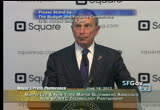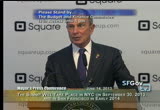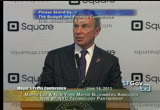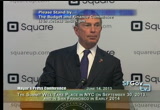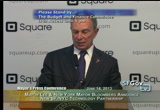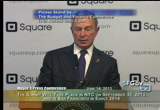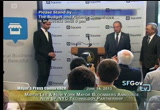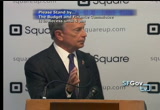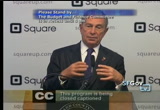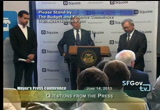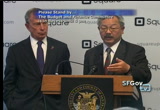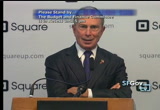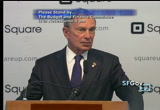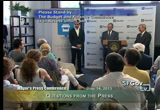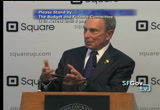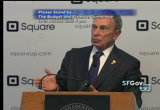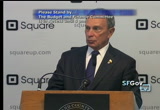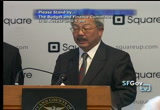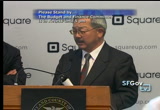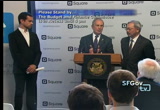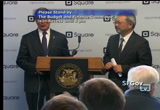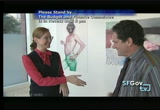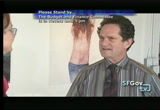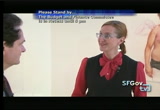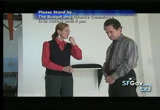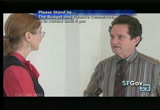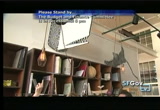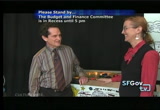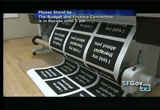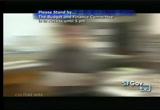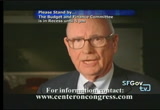tv [untitled] June 27, 2013 3:30pm-4:01pm PDT
3:30 pm
jobs create a lot of low tech jobs and we are all in this together in the support services and any type of economic activity spreads through the entire economy. it is a great example of everybody working together. city economic development is the engine of our nation and we need to provide an environment with start ups that can flourish and if we do that, all the the grid lock in washington, our economy will grow. i would reach to everybody to remember that everybody has problems, every government has problems. when you look at america, we've had 235 years of dysfunction and it's doing well so far. maybe it comes with the territory. san francisco has shown how
3:31 pm
government can function and the citizens of san francisco and the whole region are benefit ting from it. we've had something like a 30 percent in tech growth. this is what we call the big app instead of the big apple. in the next decade the capital will continue to grow. last year it was like a hundred new york city based companies that acquired $1.8 billion. it's just the beginning. if you think about san francisco and new york, the future couldn't be brighter because tech business is where the business is where people
3:32 pm
want to go. if intellectual capital is what your business requires, i don't think you can find two cities in the country that can provide that better than san francisco and new york. in new york we work very hard to bring universities like the university you have here just south of here that is so known for creating the world that we live in today. we are trying to bring that to new york and we have the cornell university, one of the great ivy league schools opening a graduate campus. it's not for undergraduates, right in new york city and they are bringing technology and cornell and it interest. it's really a powerhouse that will create jobs that we are already getting and columbia is also expanding there. engineering school is doubling the size of
3:33 pm
it and nyu is collaborating with overseas universities and we are attracting the big companies. google has a block square building and microsoft has similar to that. everyone of these companies are opening in new york city and not just opening sales office, they are opening development offices and in the same thing coming in this direction. you want to be in a place that is fun, that is diverse, and that's challenging. and i come back to the same thing here in this city and my city are going to be major game changers in the world economically and academically for years to come and they are going to add to the pool of sophisticated talent generate new jobs and economic activity. we have to
3:34 pm
figure out how the other cities are losing hope. we are a country of equal opportunity and not equal results. we have to make sure people have the ability to move up an share in the american dream and that means being self sufficient and having the education that you need to understand the issues and participate. when it comes to tech, we have a government in new york city that gets it. we have a group of business innovators and we have city data available to software developers and starts grow and constantly working to matchup investors with tech start ups in our city. city has itself a jobs developer and we've got a
3:35 pm
chief data analytics officer whose job is including combatting mortgage fraud and stopping prescription drug abuse and things like that. you wouldn't think of technology being useful but in this day and age it is. we have a mayor that road in the taxi in the first bloomberg summit in october. i'm a good customer and everybody was watching. so we look forward to seeing you in new york city and once again, thank you for your hospital. you have done a hell of a job. thank you for everything what you have done. you have made this country what it is. [ applause ] i think we'll take some on topic questions for the
3:36 pm
mayors. >> how do the summit expand engineers about the summit? >> people will go where they think there is a challenge and if companies want to be where the people they can employ, where they want to live. both of us have the responsibility of making it exciting cities but then you have companies that will come. once you get the momentum behind you, it's easy to do it. any meeting like we are having gets the best and brightest and when they come, they get publicity and ideas that they want to use. >> i think the exciting part is to identify the role of technology that everybody is not familiar with. we know that
3:37 pm
technology in businesses is valuable, but we are talking about the other jobs that technology sustains and that means how does it affect our tourism, health care, education, those areas. i think every city is going to have their ears open very widely and even send reps to gain this kind of connection and learn how to attract this technology to their cities. we've always been very open to assist other cities and create that relationship. >> it gets your interest and you around the world because they tell their families and it brings knowledge in our cities and knowledge of the world that has built products in the marketplace in your country. all of that works. kids in
3:38 pm
particular, want to come to places that are environmentally responsible that challenge you and give you lots of opportunities to live side by side with other people that have new ideas, different ideas, and that sort of thing. that's what i have always loved about san francisco. it is a dense city, not as much as city of new york. that gives you a chance to have a life experience 24/7, not just during your business day. >> other questions? >> a specific problem -- i'm wondering [inaudible] are there specific problems that you are looking -- is it a problem?
3:39 pm
[inaudible] >> we have so many problems to solve. just the other day, for example, we were trying to figure out how do we get even a better preparation in our neighborhoods for the expected earthquake disaster we are having in the city and along comes a whole bevy of coming in this economy that affects the management and the host company that is start ing in san francisco that want to plan with us and not wait for a disaster to hit and then find out that we could have accessed many people. that is helpful for the mayor to search for more partners and get ready and be more excited about recovery.
3:40 pm
when you look at what happened in new orleans and all the victims of tornados. they always tell you they could have been more ready for this had they engaged people ahead of time. this is what we are doing to improve these changes. if the economy gets hit by a major earthquake, that's an incredible hit to the rest of the country. we have to invest a lot more. that is one example of how we can use a lot more technology companies helps us with things that have challenged our cities. >> the likelihood of an earthquake is less than out here, although i have lived in city hall, working there one day when the building actually shook. it was the first that i noticed. everything did shake a little bit. it wasn't particularly frightening. right now we are trying to figure out what to do the next time there
3:41 pm
is something like hurricane sandy. yesterday i gave an hour speech, i'm sure everybody listened to every word. i was doing a speech on a 140 page book we listed on the plans that we can do to make our city more resilient. in our case we worry because we are on the atlantic coast and you have a lot of hurricanes coming off the coast and the forecast. oceans have risen a foot in the last several years and then another 2 1/2 in the next 50 years. the oceans are warmer so we would expect more storms and we have to be ready for that. we have 450 miles of coastline in new york city. we have a lot going up the rivers and we need a lot of technology to figure out how to protect from waves, from high water, from winds and that kind of thing. we have a potential because we live so
3:42 pm
densely of power out acknowledges. we have to be able to recover those. we are dependent on power. if you live on the top of an apartment building, you don't have power and you don't have water. that is a very big problem. we have thousands of people living in public housing. there is a number of hospitals that we've had to evacuate a number of them because they had their generators on the roof but they had all the infrastructure in the basement and without power, they couldn't function either. >> what are you doing to help out the -- [inaudible]
3:43 pm
>> they are going to encourage to operate -- >> we had an injunction, let me step back. regulated industries are typically, the regulation is used, the industry and the government complicit in trying to stop disruptive technologies because they want to protect what they regulate and the regulation becomes a crutch for the industry. when you come along as something simple as being able to use your cellphone to call a cab, people who already have this service, don't want that because they control it and they dispatch their cans -- cabs and they want revenue. we have two systems of cabs. yellow cabs
3:44 pm
only work in manhattan south of 9th street. there is no other reason to hail a cab in the other burrows. we have allowed for the rest of them to puck -- pick up in the rest of the city. the industry sued to stop us and the judge ruled in favor of the industry and the high court unanimously through out the judges decision and we are going ahead to selling medallions to yellow cabs and the other cabs in the other 4 1/2 burroughs where you can call them. the service is going to be much better. we have basically in new york city in the last month added two
3:45 pm
totally new transportation systems. cabs for 80 percent of the people didn't have it and bicycle share which is going to be phenomenally possible. these are not subsidized by federal city government. they are customized for every neighborhood. we have the public is a lot better off today than back then, but it's the old entrenched industries that try to shield the government regulation and try to get the local level on their side to protect the kind of competition that benefits society in the kind of competition that you and your business and everybody else in this room lives with everyday. in san francisco, as you may have heard, board president david chiu and i have shared an
3:46 pm
economy task force to fair out as much about the industry. we have a bicycle sharing starting this year. finally, how do you like those green bike lanes on market street. aren't they well painted? scooter sharing, car sharing is obviously with our dna for some time. but it's lead to new industries being treated. we want to have people have a chance to talk about what they are going to do before regulators say no. we have to have a chance to understand what this business is and as mayor bloomberg said, we are america and this is where competition is and customers are going to tell us what they want to have either the kind of service they have. i think that's the ultimate freedom to be able to do that.
3:47 pm
this is going to allow us to do that and this isn't just regulation but the movement of the business is to create new jobs and bringing a lot more people to the economy. these new industries are reflective of something that we are not aware of, but it's been going on for a long time. you talk to the pharmaceuticals in mission bay, they have been doing this for a long time to get their drugs faster. i often cite that as being part of this very spirited effort to get much more of a sharing attitude about what we are doing, in addition to the things we just talked about in terms of emergency preparedness. >> anything else? >> who do you expect to be attending these summit
3:48 pm
meetings? >> we'll think about inviting. [ laughter ] >> anyone like the city representatives? >> people that are interested in advancing their economies or creating businesses or working together and the jack dorothy and the mayor, that's the kind of person you want to have there. we also like them to come to new york and spend money in our restaurants and stay in our hotels, pay taxis. so, it's an exciting thing. any of these events. there is a collateral benefit and the people go home and say i didn't know that city was fun, affordable and friendly. that's the best kind of advertising you can possibly have. >> i also think that your education leaders might want to come or your health care
3:49 pm
leaders might want to understand where technology is and people working in any city might want to have this understanding because i think it's not just the technology businesses. it's their link to the rest of the way you make a successful city in this country and that means education, health care, infrastructure and arts and culture. that blend helps a lot of companies in san francisco help market some of these products. >> i think also i'm going to say congratulations to you. we want you to come to new york and do that for us. >> thank you, everybody. thank you for having us in your city. [ applause ]
3:50 pm
3:51 pm
been around? >> electric works has been in san francisco since the beginning of 2007. we moved here from brisbane from our old innovation. we do printmaking, gallery shows, and we have a fabulous retail store where there are lots of fun things to find. >> we will look at all of that as we walk around. it is incredible to me how many different things you do. how is it you identify that san francisco was in need of all these different services? >> it came from stepping out of graduate school in 1972. i wrote a little thing about how this is an idea, how our world should work. it should have printmaking, archiving, a gallery. it should have a retail store. in 1972, i wanted to have art sales, point-of-sale at the grocery store. >> so you go through the
3:52 pm
manifesto. with the bay area should have. you are making art incredibly accessible in so many different ways, so that is a good segue. let's take a walk around the facilities. here we are in your gallery space. can you tell me about the current show? >> the current show is jeff chadsey. he is working on mylar velum, a smooth, beautiful drawing surface. i do not know anyone that draws as well as he does. it is perfect, following the contours and making the shape of the body. >> your gallery represents artists from all over, not just the bay area, an artist that work in a lot of different media. how to use some of what you look for in artists you represent? >> it is dependent on people are confident with their materials. that is a really important thing. there is enough stuff in the
3:53 pm
world already. >> you also have in his current show an artist who makes sculpture out of some really interesting types of materials. let's go over and take a look at that. here we are in a smaller space. project gallery. >> artists used the parameters of this space to find relationships between the work that is not out in the big gallery. >> i noticed a lot of artists doing really site-specific work. >> this is a pile of balloons, something that is so familiar, like a child's balloon. in this proportion, suddenly, it becomes something out of a dream. >> or a nightmare. >> may be a nightmare. >> this one over here is even harder to figure out what the initial material is. >> this is made out of puffy paint. often, kids use it to decorate
3:54 pm
their clothes. she has made all these lines of paint. >> for the pieces we are looking at, is there a core of foam or something in the middle of these pieces that she built on top of? >> i'm not telling. >> ah, a secret. >> this silver is aluminum foil, crumbled of aluminum foil. her aesthetic is very much that quiet, japanese spatial thing that i really admire. their attention to the materiality of the things of the world. >> this is a nice juxtaposition you have going on right now. you have a more established artists alongside and emerging artists. is that something important to you as well? >> very important in this space, to have artists who really have not shown much. now let's look at other aspects of electric works operation. let's go to the bookstore.
3:55 pm
>> ok. >> in all seriousness, here we are in your store. this is the first space you encounter when you come in off the street. it has evolved since you open here into the most amazingly curious selection of things. >> this was the project for the berkeley art museum. it was -- this is from william wiley's retrospective, when he got up onstage to sing a song, 270 people put on the cat. >> it is not just a bookstore. it is a store. can you talk us through some of your favorites? >> these are made in china, but they are made out of cattails. >> these pieces of here, you have a whale head and various animals and their health over there, and they are jewelry. >> we do fund raisers for
3:56 pm
nonprofits, so we are doing a project for the magic theater, so there are some pretty funny cartoons. they are probably not for prime time. >> you sort of have a kind of holistic relationship where you might do merchandise in the store that promotes their work and practice, and also, prince for them. maybe we should go back and look at the print operation now. >> let's go. >> before we go into the print shop, i noticed some incredible items you have talked back here. what are we standing in front of? >> this is william wiley, only one earth. this is a print edition. there are only eight total, and what we wanted to do was expand the idea of printmaking.
3:57 pm
this is really an art object. there we go. >> besides the punball machine, what do you produce in limited edition? >> there is the slot machine. if you win the super jackpot, you have saved the world. >> what about work? >> the right design, it was three volumes with lithographs in each volume. the cab of count dracula with 20 lithographs inside and lined with beaver fur. really special. >> let's move on to the print shop. >> ok. the core of what we do is making things. this is an example. this is a print project that will be a fund-raiser for the contemporary music players.
3:58 pm
we decided to put it in the portfolio so you could either frame at or have it on your bookshelf. >> so nonprofits can come to you, not just visual are nonprofits, but just nonprofits can come to you, and you will produce prints for them to sell, and the profits, they can keep. >> the return on investment is usually four times to 10 times the amount of investment. this is for the bio reserve in mexico, and this is one of the artists we represent. >> you also make prints for the artists that you represent. over here are some large prints by a phenomenal artist. >> he writes these beautiful things. anyone who has told you paradise is a book of rules is -- has only appeared through the windows. this is from all over coffee. we are contract printers for all
3:59 pm
4:00 pm
>> hello, welcome to meet your district supervisor. i'm linda melkonian and we're here with supervisor london breed from district 5 which includes the inner sunset, haight/ashbury, lower hate, japantown and part of hayes valley. she was one of two supervisors in 2012. we'll talk to her about the tougher issues facing the city. welcome, supervisor. thank you for joining us today. >> thank you for having me. >> let's start by talking a little about your background, where you grew up, went to school and what of jobs you've had in the past. >> i grew up in the heart of the western addition, i grew up in public housing. my grandmother raised me and my brothers and i went to public schools here in the city. ended up at u.c. davis and graduated and immediately returned back to the community and started working for the mayor's office of neighborhood services and worked on treasure island and eventually
42 Views
IN COLLECTIONS
SFGTV: San Francisco Government Television Television Archive
Television Archive  Television Archive News Search Service
Television Archive News Search Service 
Uploaded by TV Archive on

 Live Music Archive
Live Music Archive Librivox Free Audio
Librivox Free Audio Metropolitan Museum
Metropolitan Museum Cleveland Museum of Art
Cleveland Museum of Art Internet Arcade
Internet Arcade Console Living Room
Console Living Room Books to Borrow
Books to Borrow Open Library
Open Library TV News
TV News Understanding 9/11
Understanding 9/11